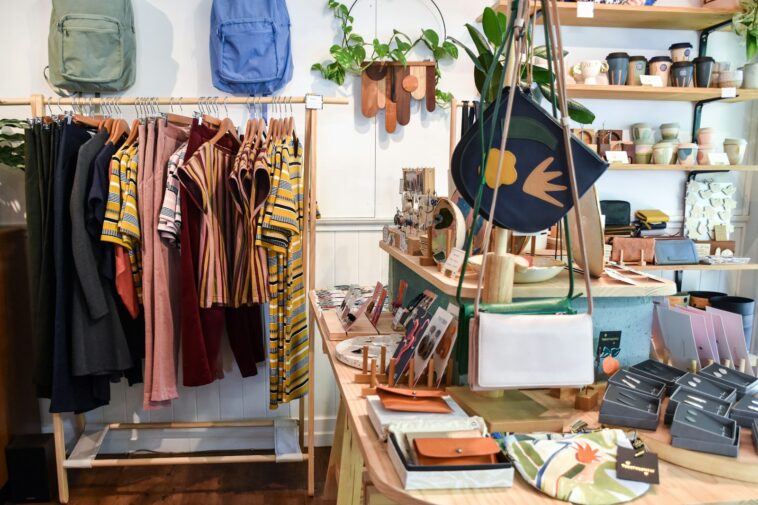Starting a business today feels both exciting and overwhelming. On one hand, technology has made it possible to reach customers all over the world without ever leaving your living room.
On the other hand, traditional businesses—the kind with a storefront, a front door, and maybe even a window display—still hold a powerful place in our communities.
I often hear people asking: should I open an online store, or should I start a brick-and-mortar business?
The truth is, there isn’t one “right” answer. Each option has its own advantages, challenges, and hidden costs. What matters most is choosing the path that fits your goals, lifestyle, and resources.
Let’s walk through both options practically, so you can see the differences and decide what makes sense for you.
The Online Store: Low Barriers, Big Reach
Starting an online store has never been easier. Platforms like Shopify, Etsy, and WooCommerce make it possible to launch a shop in a matter of hours.
The real appeal of e-commerce is the flexibility—it doesn’t matter where you’re located, and your customers can shop 24/7.
Here are some of the biggest advantages I see with going online:
1. Lower startup costs
You don’t need to sign a lease, renovate a space, or pay for utilities. Your main costs will likely be a website, inventory, shipping supplies, and marketing. This makes it far more accessible if you’re starting with limited funds.
2. Global reach
An online store lets you connect with customers across the country—or even the world. You’re not limited to the foot traffic outside your door.
3. Flexibility and scalability
You can start small, test products, and grow as demand increases. It’s relatively easy to add new items, expand categories, or even create multiple online shops.
4. Data-driven decisions
E-commerce platforms give you built-in analytics. You can see what’s selling, where your customers come from, and what pages they visit most. That kind of insight can help you adjust quickly and avoid wasting money.
But of course, there are challenges too:
High competition: The internet is crowded. Standing out requires solid branding and ongoing marketing.
Shipping logistics: Packaging, returns, and international shipping can eat up your time and margins.
Lack of physical presence: Some customers still prefer to see and touch products before buying.
The Brick-and-Mortar Store: Tangible and Trusted
Despite the rise of e-commerce, traditional storefronts remain powerful. A physical business gives you a level of visibility, credibility, and customer connection that’s hard to replicate online.
Here’s what makes brick-and-mortar appealing:
1. Personal interaction
You get to talk to customers face-to-face, answer their questions on the spot, and build trust quickly. People often remember the human experience more than the product itself.
2. Local community presence
Your shop becomes part of the neighborhood. A café, bookstore, or boutique can become a gathering spot and build loyal regulars.
3. Easier product experience
Customers can touch, try, taste, or test your products. That immediacy can remove hesitation and drive more impulse buys.
4. Brand visibility
A storefront is a constant advertisement. Even people who don’t walk in will notice your shop and might return later.
But brick-and-mortar has its downsides:
High upfront costs: Rent, renovations, furniture, signage, permits, and insurance add up quickly.
Fixed location risks: Your success depends heavily on the area, foot traffic, and local economy.
Operating hours: Unlike an online store, you can’t be open 24/7 without staff.
Overhead: Utilities, employees, and maintenance are ongoing expenses you’ll need to cover.
The Hybrid Model: Best of Both Worlds?
Many successful entrepreneurs today use a hybrid approach—running both an online store and a physical location. For example, a boutique owner might sell in-store to locals while also shipping nationwide through a website.
This setup isn’t easy, but it comes with benefits:
Multiple revenue streams
Increased brand awareness
Ability to serve both local and global customers
Flexibility if one channel slows down
Of course, managing both requires more resources, strong systems, and consistent branding across platforms. But if you can pull it off, it may offer the most stability long term.
Key Questions to Ask Yourself
If you’re still on the fence, here are some practical questions to think about:
What’s my budget? Can I afford rent and overhead, or do I need to start lean online?
Who’s my customer? Do they prefer shopping online, or do they value in-person experiences?
What am I selling? Is it a product people want to see and touch before buying, or is it something that ships easily?
What lifestyle do I want? Do I want the flexibility of working from anywhere, or do I enjoy the daily rhythm of running a store?
Am I ready to market consistently? Both options require effort to attract customers—you’ll need to commit to promoting your business regularly.
FAQs
Is it cheaper to start an online store or a brick-and-mortar business?
Generally, it’s cheaper to start online. Most online stores can launch with a few hundred to a few thousand dollars, while physical stores often require tens of thousands upfront.
Do brick-and-mortar businesses still make sense in 2025?
Absolutely. While e-commerce is growing, many customers still value in-person shopping, especially for food, personal care, and niche products. It’s all about location and execution.
Can I start online and then move into a physical store later?
Yes—and that’s often a smart approach. Starting online helps you test products, build a customer base, and generate cash flow before committing to a lease.
Do I need a website if I have a physical store?
In today’s world, yes. Even if you don’t sell online, customers often search online before visiting a store. A website with your hours, location, and product highlights builds trust.
Final Thoughts
Choosing between an online store and a brick-and-mortar business isn’t about one being “better” than the other—it’s about alignment. The right choice depends on your goals, finances, and the kind of life you want to build.
If you’re starting small with limited resources, an online store is often the safer bet. If your dream is to be a visible part of a community and you’re ready for the upfront investment, a physical shop could be the path.
And remember, you’re not locked into one forever. Many entrepreneurs start online and later expand into physical spaces—or vice versa.
So here’s my question for you: if you imagine your business five years from now, do you picture yourself greeting customers at the door, or shipping packages from your home office?





GIPHY App Key not set. Please check settings